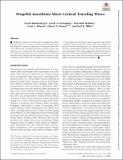Propofol Anesthesia Alters Cortical Traveling Waves
Author(s)
Bhattacharya, Sayak; Donoghue, Jacob A; Mahnke, Meredith; Brincat, Scott L; Brown, Emery Neal; Miller, Earl K; ... Show more Show less
DownloadPublished version (1.172Mb)
Publisher Policy
Publisher Policy
Article is made available in accordance with the publisher's policy and may be subject to US copyright law. Please refer to the publisher's site for terms of use.
Terms of use
Metadata
Show full item recordAbstract
<jats:title>Abstract</jats:title>
<jats:p>Oscillatory dynamics in cortex seem to organize into traveling waves that serve a variety of functions. Recent studies show that propofol, a widely used anesthetic, dramatically alters cortical oscillations by increasing slow-delta oscillatory power and coherence. It is not known how this affects traveling waves. We compared traveling waves across the cortex of non-human primates before, during, and after propofol-induced loss of consciousness (LOC). After LOC, traveling waves in the slow-delta (∼1 Hz) range increased, grew more organized, and traveled in different directions relative to the awake state. Higher frequency (8–30 Hz) traveling waves, by contrast, decreased, lost structure, and switched to directions where the slow-delta waves were less frequent. The results suggest that LOC may be due, in part, to increases in the strength and direction of slow-delta traveling waves that, in turn, alter and disrupt traveling waves in the higher frequencies associated with cognition.</jats:p>
Date issued
2022Department
Massachusetts Institute of Technology. Department of Brain and Cognitive SciencesJournal
Journal of Cognitive Neuroscience
Publisher
MIT Press - Journals
Citation
Bhattacharya, Sayak, Donoghue, Jacob A, Mahnke, Meredith, Brincat, Scott L, Brown, Emery N et al. 2022. "Propofol Anesthesia Alters Cortical Traveling Waves." Journal of Cognitive Neuroscience, 34 (7).
Version: Final published version